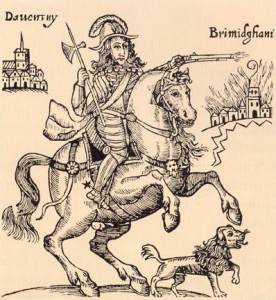Guide: The English Civil Wars
Ian Saunderson
 The English Civil Wars is a period rich in opportunities for the author. There is the breakdown of political society culminating of the trial and execution of the King, charged with maliciously making war on his own people.
The English Civil Wars is a period rich in opportunities for the author. There is the breakdown of political society culminating of the trial and execution of the King, charged with maliciously making war on his own people.
Not just England
There are in fact three civil wars and not just involving the English. The Scottish, Irish and Welsh were all involved too, with the Scots first fighting with Parliament against Charles I in the First Civil War and then with the King(s) against Parliament in the Second and Third Civil Wars. Then there’s the political and religious radicalism with the Levellers and Diggers, Fifth Monarchists, Ranters and Quakers.
Rich in genre
With this as a backdrop most historical novels focus on either the fighting or the romance.
Romance
Those in the romance category often slant towards love against all odds across the political or religious divide. Novels by Pamela Belle, Janet Mary Tomson, Cheryl Sawyer and Joanna Hines fall into the romance category.
Military
In the military category, popular with ECW re-enactors such as the Sealed Knot, we have authors such as Nicholas Carter and more recently Michael Arnold and Giles Kristian. Here we can see cynical, war-hardened veterans of wars on the European continent come home to fight, perhaps even without believing in either the King or Parliament’s cause. Or we can have the divided family theme with son against father or brother fighting brother.
More themes
A third category is the novel which explores deeper themes, for example religion, traditional beliefs and witchcraft and the links between all three. Ronan Bennett’s ‘Havoc, In Its Third Year’ is such a novel and much more, as although set in the 1630s it explores contemporary issues. While setting his book in the 1660s and therefore just outside the period of the English Civil Wars, another author tackling weightier issues is Iain Pears in his ‘An Instance of the Fingerpost’. Exploring the ideas of political radicalism with the Diggers we have ‘As Meat Loves Salt’ by Maria McCann.
A renaissance
In my collection of over a hundred historical novels, I only have seven set between 1603 and 1660 and only four of these are actually set during the English Civil Wars. Why can it be that a period so fascinating does not have more historical novels?
‘History is written by the victors’ and the pleasure loathing Puritan winners of the English Civil War did not like novels. Perhaps a bit of an anachronism, but it makes the point that the English Civil War has often been portrayed in simple black and white terms, Puritan Roundheads versus romantic Cavaliers. This could be one of the reasons why we have such a lack of novels set during this period.
One problem from an author’s point of view is that it is far easier to write about war or politics if there is a nice convenient enemy. Bernard Cornwell’s Sharpe novels feature the imperialist and sometimes atheist French which hardly upsets many British people, but to write about the English Civil Wars is difficult as it there is no convenient enemy. English, Scottish, Welsh and Irish were all involved, not always on the same side. Not only is it confusing it’s also potentially divisive, where’s the market in terms of readership?
Certainly we do seem to be experiencing a renaissance of the English Civil War novel with impending releases from Giles Kristian and Michael Arnold. We have come a long way from the Gadzooks and gainsaying type of novel which tried, and often failed to recreate authentic seventeenth century dialogue. Long may the renaissance continue.
About the author
Ian Saunderson, author of Child of Aetos, is one of the newer breed of historical novels of the war. In Child of Aetos narrator Paul Morrow tells of his service to his lord through the conflict, and it is for the reader to decide if this service caused the death of his master, the Earl of Derby.






